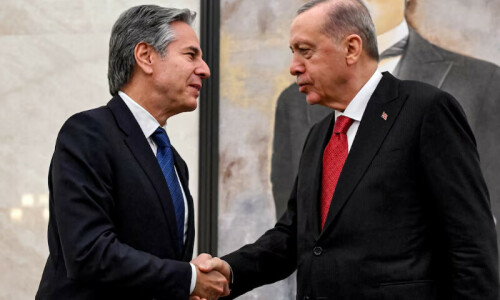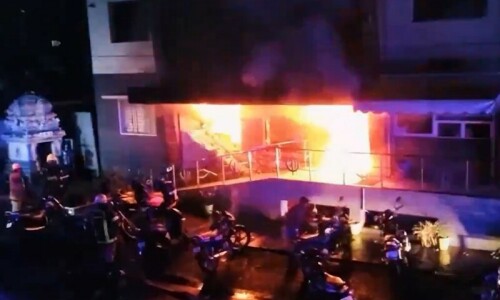KARACHI, Jan 11: Despite the seminal importance of managing and preserving crime scenes, which serve as the starting point of any investigation, the country’s police force has a dismal record in this context for even major acts of terrorism, leave alone less significant acts of crime involving the general public, Dawn has found.
The pattern of chaos and mismanagement has remained unchanged in spite of the fact that over the years, a sizable number of police officers have undergone foreign training on crime scene management and related areas. Such courses, which are usually held in Islamabad, have been organised by the United States Department of Justice, Criminal Division, and the Federal Bureau of Investigation.
Referring to the importance of crime scene management and the police force’s poor performance, a senior police officer pointed out that when Benazir Bhutto’s homecoming procession was targeted in Karachi on Oct 18, 2007, the crime scene was not kept intact. “The two blasts occurred after midnight and all evidence was removed or otherwise disturbed before the next morning,” he said. “More worrying is the fact that no senior police officer later inquired why the scene of the attacks was cleared up in such a hurry. Even the Liaquat Bagh crime scene, where the former prime minister was killed on Dec 27, 2007, was hosed down shortly after the incident.”
Questioning whether clearing the roads was more important than case investigation, he observed that “the washing away of potential evidence was apparently not because of some conspiracy but due to sheer incompetence on part of the police.”
Chaos at the crime scenes
In the case of a major crime, the scene is usually visited by the personnel of different law enforcement agencies and units such as the Crime Investigation Department (CID), the Investigations Branch, the Operations Branch, the Anti-Car Lifting Cell (ACLC) and Special Branch. Personnel of intelligence agencies such as Inter-Services Intelligence (ISI), Military Intelligence (MI) and the Intelligence Bureau (IB) also visit the crime scene.
Later, officials and functionaries such as the home minister, the governor, the chief minister or the city nazim visit the scene of the crime, in addition to large numbers of media personnel.
In such a situation, it becomes very difficult to preserve the crime scene and prevent evidence from being taken away or tampered with. “The crime scene cannot be preserved if such a large number of people roam about,” SP Raja Umar Khattab told Dawn. “In fact, there exists the possibility that vital pieces of evidence will be lost.”
When a crime takes place, the investigations branch of that area’s police is supposed to make an inventory of all the pieces of evidence and items that are found on the scene. The operations police of the area and the Rangers are supposed to cordon off the crime scene and maintain law and order. The CID and the investigations branch are supposed to work in coordination with each other, with the former analysing a crime scene for clues and assisting the latter in the collection of evidence which can then be sent for analysis.
“Regardless of which law enforcement or intelligence gathering agencies visit the crime scene, no one is supposed to collect any piece of potential evidence or take it away,” said an officer. “Every item at the crime scene is a piece of evidence and it is the Investigations Branch’s responsibility to collect it and later present it before the court.”
Working at cross purposes
What happens in practice, however, is that all the law enforcement agencies appear to feel it their duty to collect crime scene evidence.
An officer gave the example of the March 2, 2006, suicide car bombing behind Karachi’s Marriott Hotel, which killed US diplomat David Foy. “The vehicle’s chassis was located after 24 hours from the ACLC,” he informed. “Apparently in the attempt to steal a march on its sister units, ACLC personnel quietly took the chassis away from the crime scene for analysis.”
Similarly, on the condition of anonymity another officer cited the Shah Latif encounter which took place last year. He disclosed that a large cache of arms was recovered during the incident but units of various law enforcement agencies took away any items which they were able to lay their hands upon. “The area police, members of the raiding party and even Rangers took arms and ammunition away with them,” he informed Dawn.
According to SP Investigations South Niaz Ahmed Khosa, former CCPO Asad Jehangir issued a standing order in 2002 directing the operations branch to secure a crime scene until the investigations branch reached the place and secured it. “The former CCPO was compelled to issue these orders after receiving complaints that the two branches were shifting responsibility on each other,” he said.
Another officer pointed out that visits by so many people, including personnel of law enforcement and intelligence agencies, politicians, government and media functionaries, was bound to result in the despoiling of the crime scene and amounted to anarchy. “In such a situation, a terrorist can even walk right into a crime scene,” he pointed out. “If the terrorist is wearing a suicide vest, there is every possibility of transforming the first crime scene into a second one.”
Importance of crime scenes
In both conventional and modern investigation techniques, the crime scene and its preservation is of immense importance.
SP Khosa referred to the June 2004 attack on the corps commander, after which a cellphone SIM recovered from the crime scene led to the identification of the suspects.
Similarly, after the 2004 Hayderi Mosque suicide attack, the then SSP Saddar Sanaullah Abbasi found a buckle from a police belt at the crime scene. It led to the identification of the suicide bomber, who was later proved to be police constable Akbar Niazi.
On June 14, 2002, a suicide bombing took place at the US consulate in Karachi, killing 12 people and wounding 51. FBI operatives flew in from Islamabad in order to analyse the crime scene, and a local police officer told Dawn that the crime scene was preserved by the FBI operatives for between 12 and 24 hours.
The US Department of Justice’s International Criminal Investigative Training Assistance Programme (ICITAP) has, since 2002, conducted courses for training law enforcement personnel. These courses focus on three areas: training capacity, investigation capacity, and leadership and management capacity.
Training capacity focuses on all ranks of the police force, from ASI to SP level, and includes courses such as instructor development, first responder and basic criminal investigation, crime scene management and human rights.
Investigation capacity focuses mainly on investigation staff, mainly ASI to the DSP/ASP level, and the courses include areas such as interview and investigation, post-blast investigation, criminal investigation and case management. In terms of leadership development capacity, the ICITAP focuses on officers from the ranks of DSP to DIG, and the courses include leadership development, mentoring subordinates, high-profile investigations, hostage negotiations and human rights etc.
According to sources close to the organisation, however, the greatest problem in Pakistan is that the investigation starts from detained suspects instead of the crime scene. As a result, little importance is placed on preservation of the crime scene.
“There are no standard operating procedures for the management of crime scenes and even when there is a basic procedure, it is hardly followed,” said a source. “This results in the destruction of a lot of evidence. Meanwhile, even when a crime scene is secured and evidence is collected, the country lacks good forensic laboratories that could analyse the evidence properly. What’s more, no university in the country offers a degree in forensic studies.”
He believed that if standard operating procedures were developed and strictly followed, the collection and preservation of all evidence would become part of the police culture and would lead to the establishment of labs and training institutions in forensics.
Another source claimed that through the FIA and the NPB, the ICITAP provided a multi-million rupee fingerprinting system to the four provinces, 50 districts and Islamabad. “However, this system is not being used properly and no benefit is being extracted from it,” he told Dawn.
Observers believe that the basic training imparted to police at all levels needs to be revamped. “Hundreds of police officers of the ASI to SP ranks have attended courses on basic criminal investigation and crime scene management,” observed a source. “All senior police officers must also attend these courses since until they know about the techniques of crime scene management, how can they supervise the officers who are actually working on the ground? Furthermore, the police training curriculum needs be made performance-based.”
It was pointed out that the police department must not only be freed of political interference, it should be made accountable as well.
Meanwhile, some systemic changes are also required. “Roughly 14 per cent of Pakistan’s police force is involved in investigations while in the UK and the US, this figure stands at around 60 to 80 per cent,” said a source. “Not only is there a shortage of investigators in Pakistan, each one is handling far too many cases to do a good job. Similarly, less than 1 per cent of the country’s police force constitutes its senior management, while in the rest of the world this figure stands at around 15 to 20 per cent. When one commanding officer has 500 or more people working under him or her, he cannot humanly keep track of what they are all doing, and to what level of competence. The devolution of power, and delegation of tasks, is of vital importance.”
Some observers suggested brain-storming on the issue of who, and officers of which rank, are competent to decide upon the removal of crime scene evidence for major acts of terrorism. “A unit dedicated to the preservation of crime scenes can also be set up in each police zone,” said a source, explaining that several officers are already available who have undergone training in crime scene preservation.














































Dear visitor, the comments section is undergoing an overhaul and will return soon.